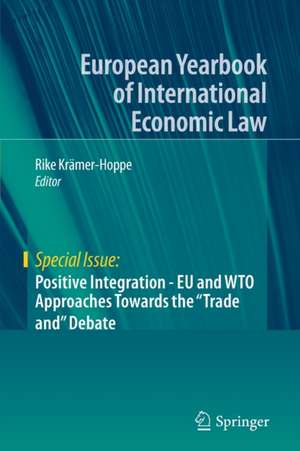Positive Integration - EU and WTO Approaches Towards the "Trade and" Debate: European Yearbook of International Economic Law
Editat de Rike Krämer-Hoppeen Limba Engleză Paperback – 8 noi 2020
This book presents a new framework for the 'trade and environment' debate and discusses the ways in which the EU and the WTO address this topic: positive, negative and non-integration. It analyses areas like food safety and renewable energy from the perspectives of legal and political science, and economics, and includes contributions focusing on various approaches, such as harmonisation, regulatory cooperation and judicialisation. In the 21st century, especially in our current times, where free trade and economic integration are increasingly being called into question, it is even more vital to find convincing normative answers and ways to address the very complex relationship between trade and environmental policies. Debunking some of the myths concerning positive and negative integration and the relationship between the two, this book is a valuable contribution to the debate on globalisation.
| Toate formatele și edițiile | Preț | Express |
|---|---|---|
| Paperback (1) | 938.04 lei 6-8 săpt. | |
| Springer International Publishing – 8 noi 2020 | 938.04 lei 6-8 săpt. | |
| Hardback (1) | 944.06 lei 6-8 săpt. | |
| Springer International Publishing – 8 noi 2019 | 944.06 lei 6-8 săpt. |
Din seria European Yearbook of International Economic Law
- 20%
 Preț: 752.66 lei
Preț: 752.66 lei - 24%
 Preț: 693.81 lei
Preț: 693.81 lei -
 Preț: 283.98 lei
Preț: 283.98 lei - 24%
 Preț: 789.00 lei
Preț: 789.00 lei -
 Preț: 345.33 lei
Preț: 345.33 lei - 20%
 Preț: 676.85 lei
Preț: 676.85 lei - 18%
 Preț: 885.63 lei
Preț: 885.63 lei - 18%
 Preț: 946.72 lei
Preț: 946.72 lei - 18%
 Preț: 1117.50 lei
Preț: 1117.50 lei - 18%
 Preț: 1113.39 lei
Preț: 1113.39 lei - 18%
 Preț: 886.92 lei
Preț: 886.92 lei - 18%
 Preț: 998.82 lei
Preț: 998.82 lei - 20%
 Preț: 582.81 lei
Preț: 582.81 lei - 18%
 Preț: 883.75 lei
Preț: 883.75 lei - 18%
 Preț: 888.95 lei
Preț: 888.95 lei - 18%
 Preț: 776.72 lei
Preț: 776.72 lei - 18%
 Preț: 780.68 lei
Preț: 780.68 lei - 18%
 Preț: 966.27 lei
Preț: 966.27 lei - 18%
 Preț: 1115.46 lei
Preț: 1115.46 lei - 18%
 Preț: 780.06 lei
Preț: 780.06 lei -
 Preț: 384.86 lei
Preț: 384.86 lei - 24%
 Preț: 842.42 lei
Preț: 842.42 lei - 18%
 Preț: 943.43 lei
Preț: 943.43 lei - 18%
 Preț: 962.98 lei
Preț: 962.98 lei - 18%
 Preț: 781.94 lei
Preț: 781.94 lei - 24%
 Preț: 830.77 lei
Preț: 830.77 lei - 24%
 Preț: 814.75 lei
Preț: 814.75 lei - 18%
 Preț: 956.03 lei
Preț: 956.03 lei - 18%
 Preț: 779.89 lei
Preț: 779.89 lei -
 Preț: 423.84 lei
Preț: 423.84 lei - 18%
 Preț: 1126.35 lei
Preț: 1126.35 lei - 24%
 Preț: 778.28 lei
Preț: 778.28 lei - 18%
 Preț: 944.82 lei
Preț: 944.82 lei
Preț: 938.04 lei
Preț vechi: 1143.94 lei
-18% Nou
Puncte Express: 1407
Preț estimativ în valută:
179.49€ • 187.40$ • 148.55£
179.49€ • 187.40$ • 148.55£
Carte tipărită la comandă
Livrare economică 04-18 aprilie
Preluare comenzi: 021 569.72.76
Specificații
ISBN-13: 9783030256647
ISBN-10: 3030256642
Pagini: 147
Ilustrații: IX, 147 p. 11 illus., 7 illus. in color.
Dimensiuni: 155 x 235 mm
Greutate: 0.23 kg
Ediția:1st ed. 2020
Editura: Springer International Publishing
Colecția Springer
Seriile European Yearbook of International Economic Law, Special Issue
Locul publicării:Cham, Switzerland
ISBN-10: 3030256642
Pagini: 147
Ilustrații: IX, 147 p. 11 illus., 7 illus. in color.
Dimensiuni: 155 x 235 mm
Greutate: 0.23 kg
Ediția:1st ed. 2020
Editura: Springer International Publishing
Colecția Springer
Seriile European Yearbook of International Economic Law, Special Issue
Locul publicării:Cham, Switzerland
Cuprins
Introduction - Positive Integration: EU and WTO approaches towards the ‘trade and’ debate.- Bilateral positive Integration – Different strategies for regulatory cooperation in the TTIP.- The role of non-tariff measures in the Agri-Food sector: Positive or Negative Instruments for trade?.- EU and WTO regulatory Approaches to Renewable Energy Subsidies: Negative integration and positive integration.- Trade and Environment in the EU and WTO: Legitimacy, Proportionality and Institutional Power Play.- Adjudication and Positive Integration - The Role of the European Court of Justice and the Dispute Settlement Body in the ‘trade and environment’ Debate.- Myths and Virtues of Positive and Negative Integration: Some Concluding Remarks.
Notă biografică
Rike Krämer-Hoppe is a senior research fellow at the Ruhr-University Bochum. Before joining the Ruhr-University, she was a lecturer at the University College London and a Jean Monnet Fellow at the New York University. She holds a PhD in law from the University Bremen. Her main fields of research are economic law, environmental law and administrative comparative law.
Textul de pe ultima copertă
This book presents a new framework for the 'trade and environment' debate and discusses the ways in which the EU and the WTO address this topic: positive, negative and non-integration. It analyses areas like food safety and renewable energy from the perspectives of legal and political science, and economics, and includes contributions focusing on various approaches, such as harmonisation, regulatory cooperation and judicialisation. In the 21st century, especially in our current times, where free trade and economic integration are increasingly being called into question, it is even more vital to find convincing normative answers and ways to address the very complex relationship between trade and environmental policies. Debunking some of the myths concerning positive and negative integration and the relationship between the two, this book is a valuable contribution to the debate on globalisation.
Caracteristici
Deals with the important "trade and" debate Provides a groundbreaking reconsideration of the positive/negative integration paradigm in the EU and the WTO Presents a new lens for the trade and environment conflict
